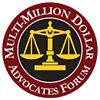Here is a diagram in markdown mermaid syntax that illustrates the general steps involved in the legal process for ridesharing accident cases in New Orleans
Jump to the Ridesharing Accident Lawyer Information You Need
- Ridesharing Accident Lawyer Attorneys Serving the State of Louisiana
- Award Winning Recognition
- Additional Ridesharing Accident Lawyer Resources
- Ridesharing Accident Lawyer Statistics Across Lousiana
- Case Results
- Who is at Fault for a Passenger’s Injuries in a Ride-Sharing Accident?
- The Personal Injury Law Firm to Handle Your Ride-Sharing Accident Claim
- Uber and Lyft Accidents Are on the Rise
- Cases We Handle
- Who Can Drive for a Ride-Share Company?
- Why Ride Share Accident Injuries Can be More Severe
- What Should I Do After a Ride-Sharing Accident?
Ride-Sharing Accident Attorneys Serving New Orleans and Louisiana
Ride-Sharing, or Ride-Hailing companies, like Uber and Lyft, are growing in popularity across the nation. However, as the use of these services grows, so does the number of accidents associated with these companies. If an accident does occur while you are a rider of a ride-sharing service, our team of injury lawyers will be on your side.
Unlike some traditional taxi cab drivers, rideshare drivers for Transportation Network Companies (TNC) (as ride-sharing companies are also known) are not employees of those companies. Therefore, TNCs are not typically responsible if a driver using their app gets in an accident. But ride-sharing companies do provide insurance to cover liability incurred by their drivers during the time they are using the rideshare app.
Though the TNC business model is not that of traditional employer and employee rideshare drivers are not exactly independent contractors either. Because passenger safety is critical to their business, ride-sharing companies require drivers and their vehicles to meet certain common qualifications in order to have access to ride-sharing platforms.
But even with safety protocols in place, rideshare accidents are happening with increasing frequency as more people use ride-sharing services. At Alvendia, Kelly & Demarest, our New Orleans rideshare accident attorneys are seeing a greater frequency of clients injured in ride-share accidents. We know how to identify the responsible parties and make sure the maximum insurance coverage is available so our clients can be fully compensated for their injuries.
At Alvendia, Kelly & Demarest, you’ll find a team of skilled lawyers who are ready to help you get the compensation you deserve.
Secure Your Compensation: Contact AKD Law’s Expert Ridesharing Accident Attorneys Today
Real Results for Car Accident Claims
GET YOUR FREE CONSULTATIONAdditional Ridesharing Accident Lawyer Resources
Helpful Ridesharing Accident Lawyer Articles
Rideshare Insurance and Settlements
Rideshare Accident Law Concepts
Who is at Fault for a Passenger’s Injuries in a Ride-Sharing Accident?
Usually, the parties at fault for causing the injuries in a Lyft or Uber accident are either the ride-sharing driver or another motorist – or both. Depending on how the accident occurred there can be other responsible parties if the actions of others contributed to the circumstances that resulted in the accident.
For instance, suppose a ride-share driver just had new brakes put on her car by a licensed mechanic. Her car’s brakes then passed the inspection done by her ride-share company. An accident occurs during a passenger transport when the driver’s brakes fail as she slams them on to avoid hitting another vehicle that failed to yield.
The mechanic may be liable for not installing the brakes properly. The ride-share company and their inspection service may be liable for not recognizing the brakes weren’t working properly. The ride-share driver may be liable if she could have done something differently and avoided or minimized the accident. And the other driver may be liable for failing to obey the law.
A competent, experienced ride-sharing accident lawyer will know how to investigate a ride-share accident and identify all responsible parties so that those injured will be fully compensated for their losses.
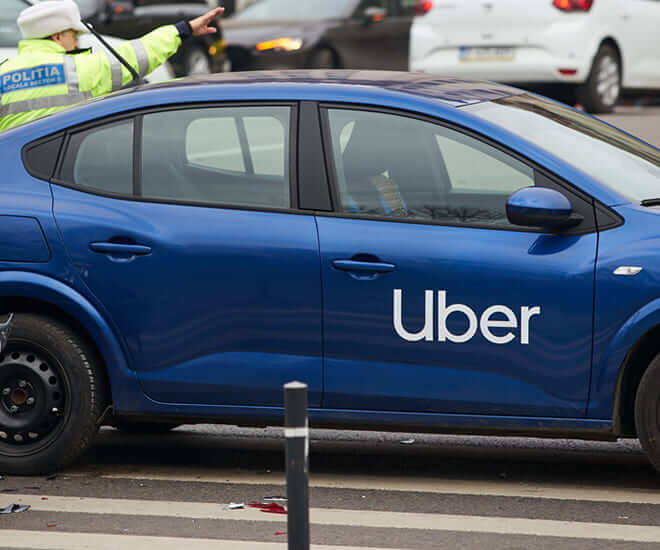
Diagram of the Legal Process for Ridesharing Accident Lawyer Cases in Iowa

As you can see, the process typically begins with a consultation with an attorney, followed by an investigation of the accident and the gathering of evidence. The attorney will then negotiate with the insurance company on your behalf, and if a settlement cannot be reached, they may file a lawsuit. The case will then proceed to litigation, which may involve settlement negotiations, discovery, and possibly a trial.
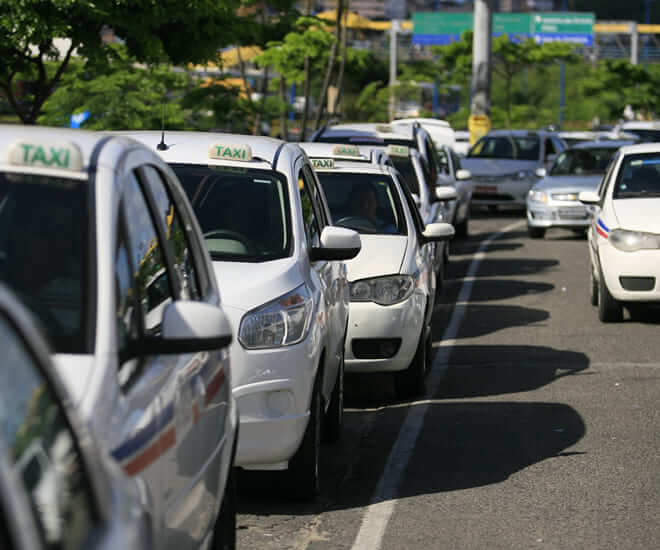
The Personal Injury Law Firm to Handle Your Ride-Sharing Accident Claim
At Alvendia, Kelly & Demarest, we have been winning battles with big insurance companies for our clients for more than 15 years. We have fought for the rights of people in our city and around the state to be compensated when they are injured by others or experience significant property damage and loss.
Our New Orleans ride-sharing accident lawyers know the ins and outs of the ride-sharing laws that apply throughout Louisiana as well as specifically to New Orleans. If you have been in a ride-share accident, we can help you identify all of the possible insurance policies available to compensate you and negotiate the best possible settlement on your behalf.
Trust Our Proven Expertise at AKD Law:
Choose the Lawyers with a Reputation for Success
Secure Your Compensation: Contact AKD Law’s Expert Ridesharing Accident Attorneys Today
Ridesharing Accident Lawyer Statistics Across Lousiana
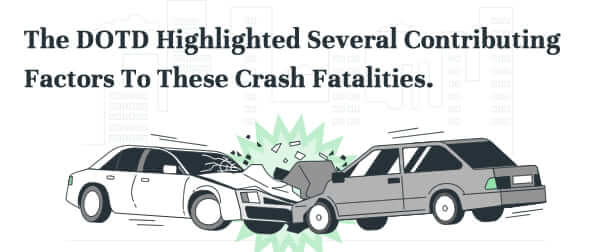
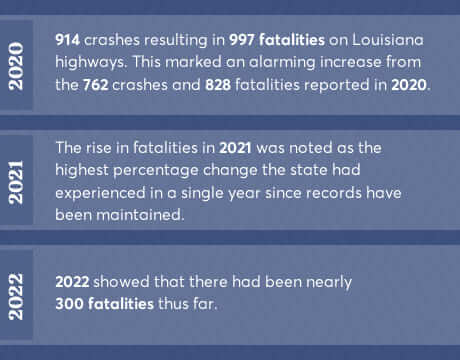
In 2021, Louisiana experienced a significant increase in traffic fatalities compared to the previous year. According to the Louisiana Department of Transportation and Development (DOTD), there were a total of 914 crashes resulting in 997 fatalities on Louisiana highways. This marked an alarming increase from the 762 crashes and 828 fatalities reported in 2020. The rise in fatalities in 2021 was noted as the highest percentage change the state had experienced in a single year since records have been maintained.
The DOTD highlighted several contributing factors to these crash fatalities. Key factors included 530 roadway departures, 390 alcohol-involved incidents, 338 cases where no restraints were used, 245 involving young drivers (ages 15-24), and 227 cases attributed to distracted or inattentive driving. It’s important to note that some incidents involved multiple factors, such as a young driver in an alcohol-related crash.
Early data for 2022 showed that there had been nearly 300 fatalities thus far. The DOTD continued to stress the importance of safe driving practices, highlighting the need for attention to road safety, especially during holiday periods like Memorial Day weekend.
https://okdpswf.maps.arcgis.com/apps/MapSeries/index.html?appid=bbceac52ab4644cb8e9d9753bfd8f137Frequently Asked Questions
Uber and Lyft Accidents Are on the Rise
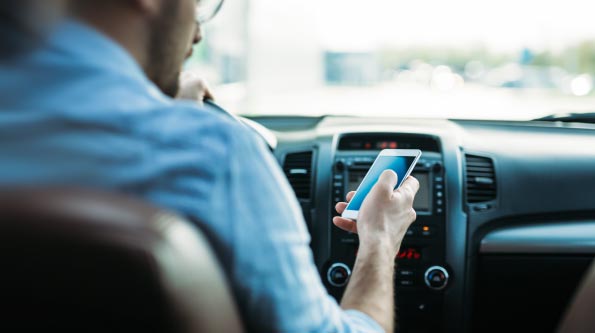
How did Ride-Sharing Get Started?
Like many popular services made possible by technology, ride-sharing began with the idea that getting a ride to where you need to go could be more efficient and more affordable if you could book and pay directly from a mobile device.
Instead of jumping into the street to try and hail a ride, you could choose from among several drivers and vehicles that could come get you at specific times. Instead of watching the taxi meter continue to go up as you sit in traffic, you are quoted a price you agree to before you start your trip.
TNC also offers people who own personal vehicles an opportunity to work for themselves and the flexibility to create their own schedules.
How Popular is Ride-Sharing?
Ride-sharing continues to increase in popularity around the world giving rise to opportunities for both riders and drivers. Statistics predict massive growth in the TNC business over the next few years.
- Currently 25% of all people in the US ride-share at least 1x per month.
- Americans using ridesharing apps more than doubled between 2015 and 2018.
- Over half a billion people worldwide use ride-sharing apps.
- People most often use ride-sharing for transport to social events or gatherings.
- The ride-sharing industry is expected to grow from $61 billion to $220 billion by 2025.
- Uber has over 3.8 million active drivers around the world.
Uber and Lyft Accidents Are on the Rise
According to a study performed by the University of Chicago and Rice University, the use of ride-sharing services has increased traffic deaths by 2-3% in the United States since 2011. This is equivalent to as many as 1,100 mortalities a year.
The accidents are directly contributed to new congestion on the road. Ride-sharing drivers spend approximately 40-60% of their time searching for passengers, creating more congestion on busy city streets.
Who Can Drive for a Ride-Share Company?
Ride-sharing companies have similar requirements that potential drivers must meet before they can use a TNC platform to transport passengers. Generally, rideshare drivers must be of driving age in their city and have a valid driver’s license. They must own a 4-door vehicle not older than 15 years that is in good working condition. Drivers must be insured, have a clean driving record, and pass a criminal background check.
Individual cities may add additional requirements. To become an Uber driver in New Orleans , a person must also:
- be at least 21 years old with 1 year of driving experience
- have 3 years of driving experience if under age 23
Those who wish to drive for Lyft in New Orleans must be at least aged 25.
Ride-Sharing Vehicle Safety Requirements
About 99% of the ride-sharing market in the US is split between TNC Uber and Lyft . Uber still has the dominant market share but Lyft has been gaining popularity in recent years. Both companies have requirements about the vehicles that can be used by their drivers. The acceptable age of a ride-sharing vehicle can differ depending on the city being driven in but there is a maximum age for all vehicles.
Qualifying ridesharing vehicles must:
- be of a certain age or newer – typically, between 10 and 15 years; no older than 15 years
- pass an inspection of mechanical and safety features
- have 4 doors
- have 5 to 8 seats and seat belts
- be a car, truck, or minivan – not a taxi, full-sized van, limousine or salvaged/rebuilt
Do Ride-Sharing Drivers Have Insurance that Covers Passengers Injured in Accidents?
Both Uber and Lyft require their drivers to carry personal insurance on their vehicles that meet the minimum financial responsibility laws for their state. There can be a couple of problems with a ride-sharing driver’s own liability insurance providing coverage for a passenger injured through the fault of the driver.
Most personal auto policies have a specific exclusion of coverage for liability from accidents that occur if the covered vehicle is being used to carry passengers for money. Businesses like cab companies and limousine services have commercial liability insurance specifically underwritten for the business of transporting passengers.
In response to the need for a product that would offer some commercial liability protection after a rideshare driver logged onto a TNC, insurance companies have begun offering ride-share coverage either by endorsement or a separate policy.
What ride-share coverage does is bridge the gap between where a ride-share driver’s personal auto insurance ends and the ride-share company’s insurance begins.
The policies provide that the driver’s personal auto insurance limits will cover them as soon as they log onto a ride-sharing app and until the ride-sharing company’s coverage begins – which is at the point a ride-share driver accepts a rider and begins en route to pick them up.
Ride-share insurance is available through several carriers in Louisiana. Drivers who purchase the coverage likely have more insurance available to pay liability claims when ride-sharing accidents occur.
However, even if a ride-share driver’s insurance does apply, a second issue is that many times the limits may be woefully low and inadequate to cover a passenger’s injuries. Louisiana only requires that drivers carry $15,000 of coverage to apply toward the injury claim of another person – and that can go quickly when serious accidents occur.
Can Injured Passengers Sue Transportation Network Companies Like Uber or Lyft?
The law regarding whether injured passengers can sue ride-share companies when their drivers get in accidents is not completely clear. The ride-share companies say you can’t sue them because their drivers are independent contractors and not employees so the companies do not control driver behavior. So far, TNCs have been able to avoid direct liability based on the behavior of their drivers by providing liability insurance that covers injuries to passengers.
But ride-share companies may be sued directly for their own behavior as regards their drivers. Louisiana requires ride-share companies operating within the state to maintain certain policies and practices when it comes to selecting and maintaining drivers.
In Louisiana, TNCs are required to:
- maintain a zero-tolerance policy for any use of drugs or alcohol while a driver is logged onto their app
- deny access to drivers with more than 3 moving violations in the last 3 years
- deny access to drivers who have been convicted of DWI within the last 7 years
If a ride-share company fails to properly vet a potential driver and that driver causes an accident that injures a passenger or others, the ride-share company may be liable.
Why Ride Share Accident Injuries Can be More Severe
Persons involved in car accidents can suffer significant injuries to any part of the body. Safety features such as airbags and seat belts help protect people from more serious injuries in the event of a crash.
Ride-share passengers typically sit in the back seat of ride-share vehicles during their transport. Although not specifically required, TNC like Uber encourages riding in the back seat as one of their safety tips. But back seat riding may not be as safe as many people still seem to think.
A recent study by the Insurance Institute for Highway Safety (IIHS) suggests that where you are seated inside a vehicle may affect how much protection you are afforded and how severely you may be injured in an accident. The study found that protections for rear-seated occupants were not as effective as those developed for occupants seated in front seats.
In addition to no front airbags for backseat passengers, the seatbelts for rear seats often lack the crash tensioners that cause the belts to tighten around occupants as a crash impact begins. Rear restraints also lack the technology to limit the force against the chest of those restrained in rear seats. Thus back seat passengers can be thrown around more and exposed to injury from impact with the inside of the vehicle and the seatbelt.
As a result, the study found that passengers seated in rear seats were more severely injured than persons seated in front seats.
The top two most common injuries experienced by passengers seated in rear seats during accidents are:
- chest injuries
- head injuries
How You Can Recover for Injuries From an Uber or Lyft Accident
Recovering compensation for injuries and damage from a ride-sharing accident usually means negotiating with the insurance companies representing the parties at fault. In ride-sharing accident cases, the passenger is never liable for the accident and the ride-share company’s liability insurance applies whether or not the ride-share driver is at fault.
Ride-share driver – If the ride-share driver is at fault for the accident, his or her personal auto policy may or may not provide coverage depending on whether the driver has ride-share coverage. The driver may also have a commercial liability policy that provides coverage. If the driver has no applicable insurance, the ride-share company’s insurance will apply. If the driver has some coverage but it isn’t adequate, the ride-share company’s insurance will apply after the driver’s insurance runs out.
Other motorists – If another motorist caused or contributed to the circumstances that resulted in the accident, that motorist’s auto liability insurance may apply. If the motorist’s insurance is not adequate to compensate for all the losses, the ride-share company’s insurance will then apply.
Ride-share company – Ride-share companies provide primary liability coverage when drivers don’t have any applicable insurance coverage and excess coverage when drivers do have coverage that applies. Coverage is primarily for passengers and other third parties who are injured by a ride-share driver’s actions. But if another motorist is responsible for the accident and does not have adequate insurance to pay for the injuries to the ride-share driver and passenger, the ride-share company has uninsured or underinsured motorist coverage that applies to both passengers and driver.
Ride-share company coverage applies differently depending on what point during the ride-share process an accident occurs. There are two relevant time periods for determining both the coverage that applies and the amounts of coverage.
Driver logged onto rideshare app and awaiting a ride request – third party liability coverage
- $50,000 bodily injury per person
- $100,000 bodily injury per accident
- $25, 000 property damage per accident
Driver en route to pick up a rider or transporting a rider – first and third-party coverage
- $1,000,000 third party liability
- Uninsured/underinsured bodily injury
- Contingent comprehensive and collision coverage
What Damages Can be Compensated in a Ride-Sharing Accident?
Under Louisiana law , persons who cause damage to others must repair that damage – which typically means providing financial compensation for the losses experienced.
When people are injured in ride-sharing accidents they may suffer both economic and non-economic losses that they are entitled to receive compensation for. In some cases, the person responsible for causing the accident acted in such a manner that they can be required to pay additional sums because their conduct was especially bad.
Compensation can be awarded for the following types of damages and conduct:
- Medical expenses – including expected future expenses related to injuries from the accident
- Lost income – for the time you are unable to work and for the opportunities you must forgo because of the accident
- Other out of pocket expenses you incurred or must incur as a result of the accident
- Property loss or damages because of the accident
- Pain and suffering – for the physical discomfort you experienced from the accident
- Mental and emotional distress and anguish you experience after the accident
- Exemplary amounts when the person responsible for the accident was intoxicated while operating a motor vehicle
After a ride-sharing accident, you’ll want to speak with an experienced accident attorney to help you recover what you’ve lost physically and emotionally due to injuries and stress. You want the lawyers at AKD.
Call our office at 504-618-1638 to schedule a free consultation or contact us
What Should I Do After a Ride-Sharing Accident?
With ride-sharing accidents on the rise, there is always a chance that an accident could occur on your trip. In the case of an Uber or Lyft accident, there are some important steps you should take to ensure your safety.
- Seek medical attention and help: Call 911 to report your injuries or injuries of others, even if you’re not sure any injuries have been sustained. Local law enforcement will need to be present at the scene to report the accident.
- Gather witnesses or photos: To help your case, make sure you ask for the phone numbers and names of any witnesses. If you’re able, take some photos of the accident.
- Report the accident to the company: You’ll need to report the accident to Uber or Lyft for their records.
- Consult with your attorney: It’s critical to consult with your attorney after an accident. This is especially important when the accident involves another party, such as an Uber or Lyft driver.
After a ride-sharing accident, you’ll want to speak with an experienced accident attorney to help you recover what you’ve lost physically and emotionally due to injuries and stress. You want the lawyers at AKD.
Call our office at 504-618-1638 to schedule a free consultation or contact us
Secure Your Compensation: Contact AKD Law’s Expert Ridesharing Accident Attorneys Today
Personal Injury Practice Areas
-

Wrongful Death
-

Car Accidents
-

Truck Accidents
-

Motorcycle Accidents
-

Industrial Accidents
-
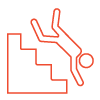
Catastrophic &
Serious Injuries -

Pedestrian Accidents
-

Bicycle Accidents
-

Defective Medical Device
-

Premises Liability &
Slip-and-Fall Injuries -

Ride-Sharing Accidents
-

Class Action & Mass Tort
-

Uninsured & Underinsured
Motorist Accidents -

Chemical Exposure
& Lead Poisoning -

Medical Malpractice



